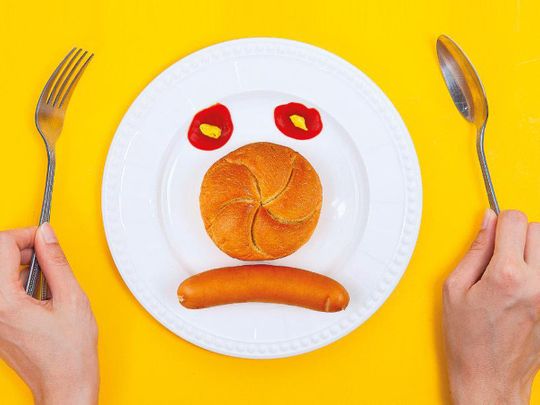
My daughter doesn’t do vegetables. Mashing, grating, hiding, disguising - you name it; we’ve either tried it or fried it (that doesn’t work either). Instead, she turns her nose up at anything green (except jelly beans and gummy bears) and pleads for sugar instead. Her diet is far from balanced but she’s happy and healthy. And she’s four, so I figured her fussiness was normal and thought no more of it.
Until the day she demanded a diet cola for breakfast. I laughed and said no – nobody has diet cola for breakfast - then realized I had a can of it in my own hand. Because, while I may make healthy meals a priority for her, as a busy mum on-the-go, I often pass up proper food in favour of fizzy drinks, or turn to sugary snacks to power me through parenthood.
But the diet cola debacle made me realise I’d been so busy watching what she eats I hadn’t noticed she’d been watching me right back. And what she saw wasn’t pretty. If I didn’t do something drastic, I knew I’d hand down a legacy of dysfunctional dietary habits, regardless of how many vegetables I stuffed into her spaghetti sauce.
Don’t just talk the talk
Calorie-rich and nutrient-poor foods are a major factor contributing to global obesity and a key challenge to parents with young children, according to a University of Oregon study published in the Journal of Public Policy & Marketing.
The research explored the dynamics of parental food preferences and how they are passed down to their kids, and found that a parent’s consumption of sugar, fat and salt influences the child’s preference for the same.
Additionally, manifold studies have found links between parental food habits and child or teen eating disorders, as well as parental food practices (such as controlling/ restricting certain foods, and bribing or comforting with certain foods) and obesity or disordered eating in adulthood.
“Eating habits are learned,” psychologist and director of the Thrive Wellbeing Centre in Dubai, Dr Sarah Rasmi, agrees. “We pass them down to our children through modelling not through DNA.”
Which means that all the healthy choices I’ve been giving my daughter won’t make a bit of difference if she sees me tucking into a burger and chips instead. “Children learn by imitation and movement before the age of seven,” confirms founder of the Chiron Clinic, Dr Lanalle Dunn. “The best parent is always the one that is embodying their own values”.
Separate food from emotion
Embodying values is one thing but there are some days when I feel like I genuinely need chocolate, whether it’s to celebrate a good day or forget a bad one. Assigning emotion to food is something that cofounder of Love Parenting UAE and toddler calm consultant Amy Vogelaar believes may have its roots in childhood. “For so many of us growing up, food was love,” she says. “Food is a very fraught issue for families – we have a primal desire to feed our children - but we need to find other ways to express our love.”
Vogelaar advises separating feelings from food entirely and seeing it simply as the fuel that allows us to function. “Food can be given with love but it is not love itself,” she continues. “We need to be conscious with praise and punishment around food and avoid making value judgments. We don’t want to make broccoli the chore and doughnuts the prize - it’s just food.”
Don’t reward with edible treats
Dr Rasmi agrees, telling me: “My number one suggestion is to avoid rewarding children – or cheering them up – with food. Treating food as sustenance, as opposed to something good or bad, is the first line of defense against emotional eating.”
I think of all the times I’ve tried to soothe a toddler with a sweet and the way food was a reward for doing well when I was growing up. And I vow to try and peel the labels off the food I offer – not literally – and find different ways to express my love, hoping it will make my daughter more open to new things and easier to feed than I was.
Have family meals
Luckily when it comes to overhauling your approach to eating, the whole family has a part to play. The benefits of having family meals together are well documented (research suggests they lead to anything from better relationships to better grades), but experts now believe they also lead to better food choices. A study in 2000 found that children who enjoyed regular meals with their families ate more fruit and vegetables while one in 2003 found the children who eat more often with their parents are more open to trying new things.
“Family mealtime is essential for kids,” says Vogelaar. “It can be a struggle but it’s worth finding the time to sit down together. It’s an opportunity to get kids interested in where the food comes from and, as they get older, for them to take an interest in preparing it. It should also be a chance to take the pressure off and enjoy time together.”
Switch up the dynamic
But what if your family dinner table is less of a place to catch up and more of a place to fall out? I’ve lost count of the amount of times teatime has ended in tears of frustration (me) or anger (her) as we wage war over what and whether or not she’ll eat.
“Food can be a battleground for the parent that is usually in charge of mealtimes,” sympathises Dr Rasmi. “Sometimes it can help for the other parent to take the lead during mealtime. Many of the families that I work with find their kids are more likely to eat (or eat a wider variety of food) when the parent that doesn’t usually feed them takes over. It can also be a nice break for the parent who usually leads – sometimes that breathing space is what they need to change the mealtime dynamic.”
Limit the number of food choices
“I find a lot of parents give too many food choices to kids these days,” says Dr Dunn. “Then they feel bad because their children aren’t happier with healthier food options.”
I think about the lists of dishes I lay out in front of my daughter on a daily basis and the way I leap to make a second option if the first one doesn’t appeal. “I don’t encourage parents to be a short-order cook,” laughs Vogelaar. “Sometimes you may want to offer an alternative like bread, but if that’s all they eat at that meal, it’s not the end of the world. Toddlers and small children need to eat less than we think and they should be getting frequent snacks and opportunities to eat throughout the day. If you make sure you’re offering healthy, nutritional foods at those points you know they’re going to have another opportunity to eat in a couple of hours. So if they turn down their meal, it’s much less stressful.”
Don’t stress the small stuff
Stress is a word that crops up repeatedly around children and food and that, more than anything else, could be the thing that has the most long-lasting negative impact. “We know that anxiety in the parents can contribute to anxiety in the child,” said Director of the Eating Disorders Unit and the Bethlem Royal Hospital in London, Janet Treasure, when talking about genetic links to anorexia.
All the experts I spoke to also talked about the importance of removing stress from any food-related situation. “Take a week off from the battle,” pleads Vogelaar. “Tell yourself I won’t do any bribing, tricking, forcing for a week. Almost universally I hear even on day one, once the pressure was off, the child ate more and was happier to be there.
The parent’s responsibility is to decide what they’re going to offer, what time they‘re going to offer it and where. Everything else is up to the child
“I suggest the parents I work with remember that while the parent has a job so does the child and neither should worry about what the other person’s doing. The parent’s responsibility is to decide what they’re going to offer, what time they‘re going to offer it and where.
“Everything else is up to the child. They get to decide how much they want or if they want to eat at all. If they don’t like everything that’s on offer that is not the parent’s responsibility. We know our own children – as long as they’re bright-eyed, energetic busy little people, we can rest assured they’re eating properly.
When it's normal... and when it's not
While it's important not to worry too much about your child's eating, there are exceptions, adds Vogelaar: "If your child isn’t gaining weight it may be that you’ve run into medical or dental issues and it’s worth checking out. Some kids have sensory issues with the texture of certain foods or have had an episode with vomiting or choking that means they might need extra help. But that’s a very small minority.
“I think we’ve got to remember that a fussy stage is quite normal. Part of the job of a child is to start to have opinions and exercise them. Parents who are really worried about their child’s diet should keep offering the food, have it on the table and show their child they enjoy it themselves, but leave it up to the child. There’s no evidence that forcing a child to eat something ever ended well. Take the pressure off – some people will never like sweet potato and that’s OK.”
Suddenly I feel so much better. The idea of helping my daughter become healthier by being less controlling over her diet rather than more seems so more manageable than fighting over every last fish finger. In fact, I almost feel like celebrating. Just not with chocolate.










